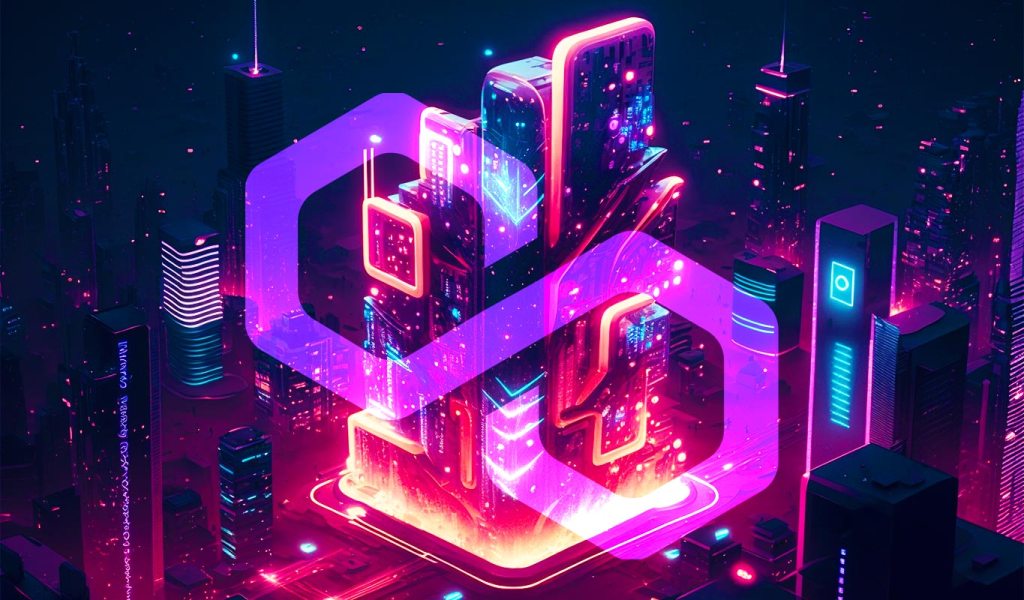 This partnership will see Google Cloud serve as the primary cloud provider for the Cronos ecosystem. Partnership Aims to Accelerate Cronos Ecosystem’s Growth A strategic relationship extension with Google Cloud has been announced by Cronos Labs, a blockchain startup accelerator dedicated to expanding the Cronos blockchain ecosystem. Google Cloud will be the main cloud provider […]
This partnership will see Google Cloud serve as the primary cloud provider for the Cronos ecosystem. Partnership Aims to Accelerate Cronos Ecosystem’s Growth A strategic relationship extension with Google Cloud has been announced by Cronos Labs, a blockchain startup accelerator dedicated to expanding the Cronos blockchain ecosystem. Google Cloud will be the main cloud provider […]

Google Cloud will contribute to Cronos’ decentralization and security, along with other notable validators like Crypto.com and Blockdaemon.
Google Cloud has become the main validator of the Cronos blockchain, showcasing the growing adoption of cryptocurrency by global technology giants.
As an expansion of its strategic partnership with Cronos Labs, Google Cloud will become the main validator on the blockchain, aiming to bring more technical innovation and increase developer adoption on the network.
The partnership is a sign of Google Cloud strengthening its commitment to the Web3 space, according to Rishi Ramchandani, the head of Web3 APAC at Google Cloud. He wrote:

The new “Gameshift” service will serve as a Web2-to-Web3 bridge for developers.
Solana Labs and Google Cloud recently launched Gameshift, a gaming development API that aims to bridge traditional Web2 experiences with Web3 services such as blockchain technology and digital asset management.
The new suite of tools was announced at the 2024 Solana Breakpoint conference during the “Gamer Village” side stage events. Gameshift is the next stage of the two companies’ extended partnership and is currently available on the Google Cloud Marketplace.
According to a blog post from Google Cloud, Gameshift is an API that provides a full suite of foundational Web3 services to projects hosted within the cloud ecosystem.

The cloud division of one of the biggest companies in tech is teaming up with blockchain project Sui (SUI) to help build a more user-friendly, safer and smarter Web3. In a new announcement, Google Cloud says it is partnering with Sui to focus on improving Web3 security, scalability, developer tools and user experience through artificial intelligence (AI) technology. The collaboration […]
The post Google Cloud Announces Partnership With Solana Rival Sui for Better AI, Security and Scalability Capabilities appeared first on The Daily Hodl.

Google Cloud is now an official validator for the layer-2 blockchain Polygon (MATIC) proof-of-stake (POS) network. Polygon Labs says that Google Cloud now joins more than 100 other validators in securing the Ethereum (ETH) scaling solution’s network. The project notes that “high-quality, trusted, security-minded validators like Google Cloud provide an added layer of security” for […]
The post Google Cloud Now a Polygon (MATIC) Network Validator Nearly a Year After Unveiling Same Service for Solana (SOL) appeared first on The Daily Hodl.

Google’s BigQuery added 11 new public datasets for blockchain networks, allowing users to obtain a variety of data from these networks.
Google Cloud’s BigQuery service just added 11 blockchains networks to its data warehouse, according to a September 21 blog post. The new networks include Avalanche, Arbitrum, Cronos, Ethereum Görli testnet, Fantom, Near, Optimism, Polkadot, Polygon mainnet, Polygon Mumbai testnet, and Tron.
We're enhancing our #blockchain data offering with 11 new chains in #BigQuery, and we’re also making improvements to our existing datasets, so they are more precise, accurate, and reliable.
— Google Cloud (@googlecloud) September 21, 2023
Learn more ↓https://t.co/fNFJiHSJBO
BigQuery is Google’s data warehouse service. Enterprise firms can use it to store their data and make queries of it. It also provides some public datasets that can be queried, including Google Trends, American Community Service demographic information, Google Analytics, and others.
In 2018, Google launched a Bitcoin dataset as part of the service, and later that year, it added Ethereum as well. It continued to expand its blockchain coverage in February of 2019, adding Bitcoin Cash, Dash, Dogecoin, Ethereum Classic, Litecoin, and Zcash. The September 21 announcement means that BigQuery now carries data from a total of 19 blockchain networks.
In addition to adding these new blockchains, Google has also implemented a new feature intended to make blockchains queries easier to execute. Through a series of user-defined functions (UDFs), the team has provided methods to handle the long-form decimal results often found on blockchains. In its post, Google claimed that these new functions will “give customers access to longer decimal digits for their blockchain data and reduce rounding errors in computation.”
Google Cloud has been taking an increasing interest in blockchain tech in 2023. On July 7, it partnered with Voltage, a Lightning Network infrastructure provider. And it partnered with Web3 startup Orderly Network on September 14 to help provide off-chain components for decentralized finance.

While TradFi is the main source of demand for blockchain tech, digital identity and supply chain are exciting areas too, according to Google Cloud Head of Web3 James Tromans.
The crypto industry is far too focused on token prices, rather than figuring out how smart contracts can be used to solve real-world business problems, according to Google Cloud's Web3 lead.
In an interview with Cointelegraph, Google Cloud’s Head of Web3 James Tromans stressed the need to focus more on the business logic in the smart contract rather than the supply and demand dynamics of the token:
“What are the business problems that you want to get executed? When you're running a smart contract to execute some business logic to solve your business problem, you're using a token, but the token is not the thing, it’s the business problem that's the thing.”
“So I would like us to get away from all this talk about tokens and token speculation as if that is Web3 — that is not Web3,” Tromans added.
One of Google Cloud’s main blockchain services is its Blockchain Node Engine, offering users a self-hosted node to access blockchain data, conduct transactions, build smart contracts and run decentralized applications.
Tromans argued that blockchain and smart contracts can lead to innovation, lower operational costs and new revenue streams.

Despite the bear market, Tromans said Google Cloud has still seen strong demand from enterprises looking to integrate blockchain technology:
“Over the past 12 to 15 months in the traditional enterprise space, interest in leveraging blockchain technology to improve efficiency, reduce cost and improve the speed of innovation hasn't gone away.”
Most of this demand has come from the TradFi sector to solve basic finance and accounting problems, Tromans explained. But Google Cloud customers are increasingly looking at integrating blockchain-based solutions in digital identity and supply chain, he added.
Digital ID in particular has been a hot topic of debate in the Web3 world of late, with the recent launch of Worldcoin on Jul. 24 — an iris biometric cryptocurrency project founded by OpenAI chief executive Sam Altman in 2019.
Tromans however argues that blockchain tech won't likely see mass adoption, at least until user experience improves.
“If the average end user, who isn't a computer scientist, who doesn't understand blockchain, has to know about their private keys — we've got it wrong. They have to be abstracted away,” he explained.
“When you load the Web browser, you're using a bunch of high tech capabilities like TCP-IP and HTTPS. None of these protocols mean anything to most people,” Tromans added, suggesting that Web3 should strive for the same thing.
Tromans said Web3 developers will need to build frictionless solutions to help users recover private keys and help take care of their data for them to have a “fantastic” user experience.
Thank you @savannah_fortis for a great fireside discussion at #ProofOfTalk in Paris this week. https://t.co/U3BjAU878k
— James Tromans (@jmtromans) June 16, 2023
Related: Google Cloud broadens Web3 startup program with 11 blockchain firms
When user experience is optimized, blockchain technology will solve problems in a range of industries, he said.
“When this technology is solving for payment, helping games have lower cost or helping artists be more creative and get paid for their work so they can have careers but not actually have to know about how the technology is functioning, that's critical [and] very, very important for the wide scale adoption of the technology.”
“When Web3 hits mass adoption, we won't call it Web3. We'll just call it the web again,” he said.
Magazine: Joe Lubin — The truth about ETH founders split and ‘Crypto Google’

Tech titan Google is launching an artificial intelligence (AI) based anti-money laundering system after working with banking giant HSBC. According to a new statement by Google Cloud, the firm is launching a new system to help global financial institutions more efficiently detect money laundering. The product is designed to improve the traditional methods of countering […]
The post Google Launches ‘Anti Money Laundering AI’ in Collaboration With Banking Giant HSBC appeared first on The Daily Hodl.
Wendy’s says its "FreshAI" bot reduces costs allowing funds to be focused elsewhere, others worry that eventually, those less skilled will be jobless.
An artificial intelligence (AI) chatbot dubbed "Wendy’s FreshAI," will take orders from Wendy's drive-thru customers after the fast-food chain partnered with Google Cloud to create the bot.
Over three-quarters of Wendy’s customers prefer to place their orders via drive-thru, according to a May 9 announcement from Google Cloud and the Tech Giant claimed using a chatbot to service these customers will “revolutionize the quick service restaurant industry.”
AI chatbots such as OpenAI's ChatGPT use natural language processing to understand what people are saying, and then use machine learning algorithms to generate a response.
"Generative AI helps companies transform applications and services. @Wendys is at the forefront of applying #generativeAI into their business in ways that help transform the customer, employee, and overall restaurant experience"—@MaribelLopez https://t.co/bS2IQXZdWU
— Google Cloud (@googlecloud) May 9, 2023
In a statement to Wall Street Journal, Wendy’s CEO and president Todd Penegor said the chatbot “will be very conservational,” adding “you won’t know you’re talking to anybody but an employee.”
Google Cloud CEO Thomas Kurian noted, however, there many challenges associated with using chatbots to service drive-thru customers though, and said:
“You may think driving by and speaking into a drive-through is an easy problem for AI, but it’s actually one of the hardest”
The diversity of customers' orders is one challenge that Wendy’s and Google Cloud will have to overcome, as many customers might call menu items by a different name or have special requests. Additionally, the chatbot will also have to filter out any background noise.
To help refine the AI chatbot before it is rolled out to multiple stores, Wendy’s FreshAI will undergo a pilot launch at a Columbus, Ohio, restaurant in June. Customers will still have the option to speak to a human too.
Related: 5 ways AI is helping to improve customer service in e-commerce
Not everyone is impressed with the announcement though, with some arguing it's the latest way companies are “systematically eradicating jobs” and highlighted teenagers and others who are less skilled looking to gain employment would be the most affected by the change.
@Wendys joining the ever growing list of companies systemically eradicating jobs. Guess high school kids can just suck it for part time jobs to give them a start in the world. Enjoy your AI and bankruptcy. I'm not talking to a computer. #DeathofFastFood pic.twitter.com/BbggeblhOz
— -PAPatriot--- (@PAPatriot14) May 10, 2023
While AI has enormous potential to improve efficiency, increase productivity, and reduce costs in various industries, its unprecedented growth has many worried that it will bring about massive falls in employment as AI is used for tasks previously assigned to humans.
Magazine: $3.4B of Bitcoin in a popcorn tin — The Silk Road hacker’s story